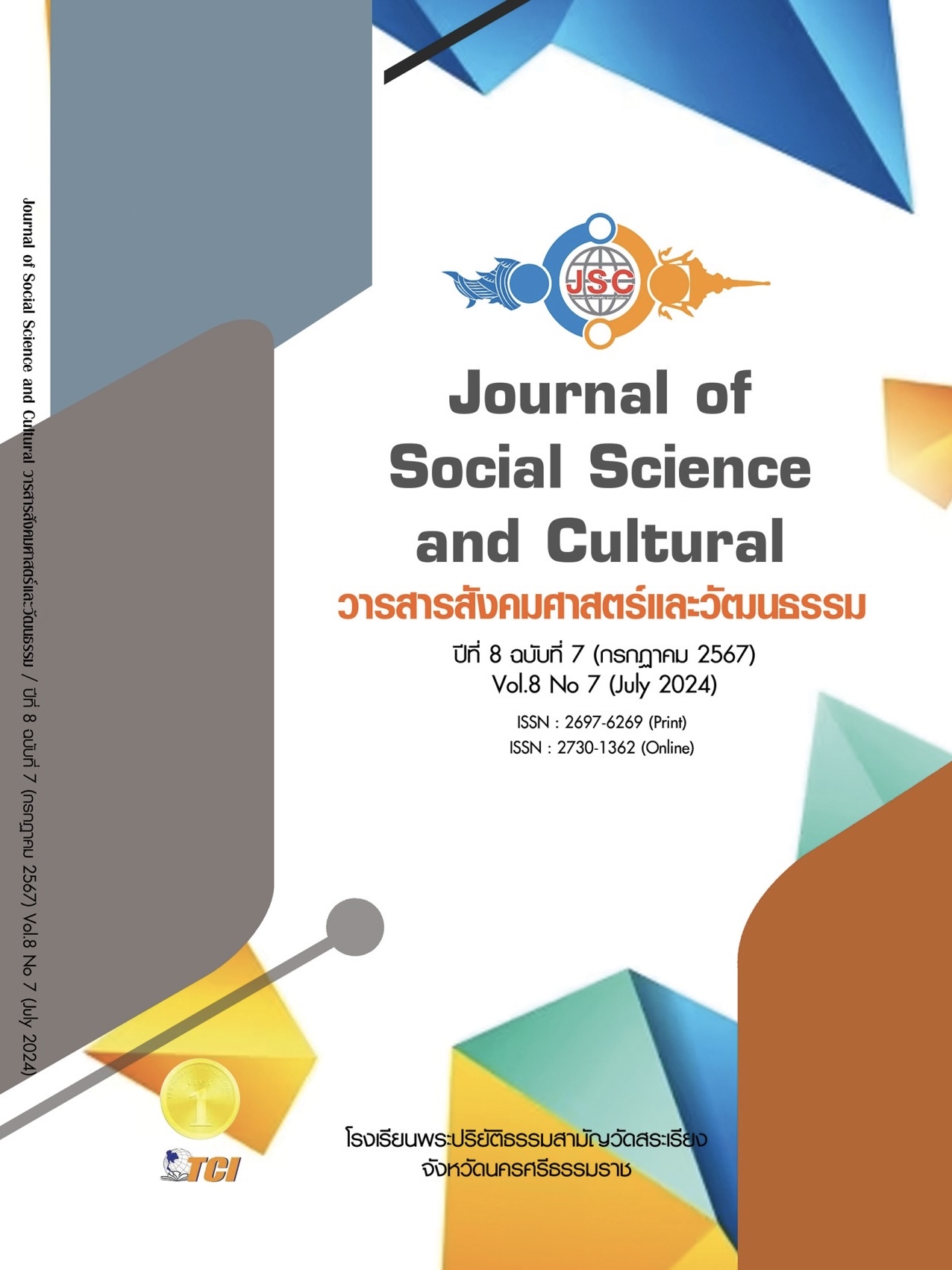DEVELOPMENT OF CITIZENSHIP TEACHING USING A SCENARIO-BASED LEARNING TO BUILD CRITICAL THINKING SKILLS OF HIGH SCHOOL STUDENTS
Main Article Content
Abstract
This study sought to achieve 2 primary objectives: to assess the efficacy of scenario-based learning in enhancing the critical thinking abilities of 12 grade students in the subject of citizenship, and to devise a lesson plan for Civics utilizing scenario-based learning as a means to cultivate critical thinking skills. The research sample comprised 30 students from Srinakharinwirot University Prasarnmit Demonstration School (Secondary), Semester 2, academic year 2023, selected via a simple random sampling technique. The study employed a lesson management plan in Civics that integrated scenario-based learning to foster critical thinking skills, alongside a corresponding assessment tool for measuring these skills. The findings revealed a statistically significant increase in critical thinking skills among students following the implementation of Civics instruction using scenario-based learning, as evidenced by a comparison of pre- and post-lesson assessments at a significance level of .01. Moreover, the outcomes of the lesson management plan indicated a comprehensive enhancement in students' critical thinking abilities, as evaluated through the developmental interaction scale. The development of learning management plans with a focus on encouraging students to think critically fosters a collaborative exchange between students and teachers within a contextually relevant framework. Such an approach is congruent with the developmental stage of the learners and aligns with their interests, thereby facilitating the cultivation of critical thinking skills in accordance with their age and cognitive capacities.
Article Details
References
กมลชนก สกนธวัฒน์. (2562). การพัฒนาชุดกิจกรรมการเรียนรู้ทางเศรษฐศาสตร์โดยใช้แนวคิดการเรียนรู้แบบฉากทัศน์เป็นฐานเพื่อส่งเสริมความฉลาดรู้การเงินของนักเรียนมัธยมศึกษาตอนต้น. กรุงเทพมหานคร: คณะครุศาสตร์ จุฬาลงกรณ์มหาวิทยาลัย.
กระทรวงศึกษาธิการ. (2566). นโยบายและจุดเน้นของกระทรวงศึกษาธิการประจำปีงบประมาณ 2566. กรุงเทพมหานคร: ครุสภา.
ณัฏฐพงศ์ ลำภูทอง. (2565). การพัฒนารูปแบบการเรียนการสอนเพื่อส่งเสริมทักษะการคิดเชิงวิพากษ์สำหรับนักเรียนชั้นมัธยมศึกษาตอนปลาย. วารสาร มจร พุทธปัญญาปริทรรศน์, 7(3), 283-295.
ปิยะบุตร ถิ่นถา. (2565). การพัฒนาความสามารถในการแก้ปัญหาอย่างสร้างสรรค์โดยใช้ฉากทัศน์เป็นฐาน วิชาภูมิศาสตร์ ของนักเรียนชั้นมัธยมศึกษาปีที่ 3 วิทยาลัยนาฏศิลป. วารสารมนุษยสังคมปริทัศน์, 24(1), 95-109.
ปุญญากรณ์ วีระพงษานันท์. (2560). การพัฒนาแบบวัดลักษณะนิสัยการคิดอย่างมีวิตจารณาญาณของนักเรียนชั้นมัธยมศึกษาตอนปลายในเขตกรุงเทพมหานคร. กรุงเทพมหานคร: มหาวิทยาลัยศรีนครินทรวิโรฒ.
สำนักงานคณะกรรมการการศึกษาขั้นพื้นฐาน. (2565). แผนการพัฒนาการศึกษาขั้นพื้นฐาน (พ.ศ.2566 - 2570). กรุงเทพมหานคร: ครุสภา.
สุภชัย ปิ่นมณี. (2566). ผลของการจัดกิจกรรมการเรียนรู้ภูมิศาสตร์ด้วยแนวคิดการเรียนรู้โดยใช้ฉากทัศน์เป็นฐานที่ส่งผลต่อทักษะการสร้างแผนที่และทักษะการคิดเชิงพื้นที่ของนักเรียนมัธยมศึกษาตอนปลาย. กรุงเทพมหานคร: มหาวิทยาลัยศรีนครินทรวิโรฒ.
Thai Civic Education. (2556). กรอบแนวคิดหลักสูตรเพื่อสร้างความเป็นพลเมืองในระบอบประชาธิปไตยของไทย. กรุงเทพมหานคร: เทคนิค อิมเมจ.
Tsai, M. H. (2020). Exploring the effects of a serious game-based learning package for disaster prevention education: The case of Battle of Flooding Protection. International Journal of Disaster Risk Reduction, 43(5), 89-104.
UNESCO. (2015). Global Citizenship Education: Topics and Learning Objectives. Paris: the United Nations Educational, Scientific and Cultural Organizatio.
United Nations. (2015). Sustainable Development Goals. Switzerland: United Nations.
Westheimer, J. (2016). Teaching Children to Think. Retrieved มกราคม 1, 2567, from https://www.nais.org/magazine/independent-school/winter-2016/teaching-children-to-think


